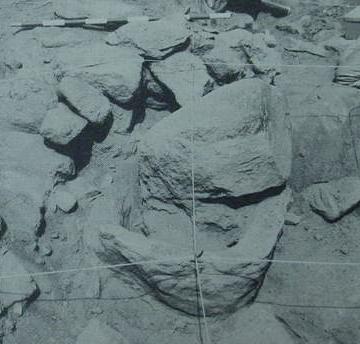God, Yahweh-Elohim, as "Israel's Rock" (boulder, large stone) in the Sinai Wilderness
(The Archaeological evidence of, at the Ramesside 12th century BC Midianite Tent-shrine at Har Timna)
08 March 2010
In the Bible God is frequently spoken of in metaphorical language as being a "Rock" or "Rock of Salvation" and other gods are alluded to as being regarded as "Rocks" by their worshippers. Perhaps these verses are recalling, in part, Midianite religious beliefs? Moses' father-in-law was Jethro who some scholars have suggested was a Midianite priest of Yahweh.
Rothenberg, who excavated at Har Timna an Egyptian shrine to the Goddess Hathor, a patroness of copper miners, noted that after the site was abandoned in Ramesside times (12th century BC) the Midianites purged the site of its Egyptian trappings and erected a tent-shrine on the spot. They erected a row of standing stones called by scholars masseboth and among these stones was a stone basin (perhaps used by the Egyptians for ritual ablutions?).
Rothenberg found a great rock, a granite boulder or stone, placed atop this stone basin which contained apparently Midianite tent-shrine shrine offerings consisting in part of textiles. The Bible suggests that Israelite women wove textiles and gave them as offerings to the Tabernacle staff at Mount Sinai. Could these biblical statements be allusions to genuine nomadic Midianite practices? Is the Midianite tent-shrine found at Har Timna recalling Israel's tent-shrine or Tabernacle at Mount Sinai? That is to say some Israelite notions about Exodus events in the Sinai and Arabah may be based on Midianite religious beliefs as documented at Har Timna in the Arabah?
Some Bible verses alluding to Yahweh in metaphorical language as a great rock (a stone or boulder?):
Deuteronomy 32: 3-4 RSV
"For I will proclaim the name of the Lord,
ascribe greatness to our God!
The Rock, his work is perfect;
for all his ways are justice."
Deuteronomy 32:30-31, 37
"How should one chase a thousand,
and two put ten thousand to flight,
unless their Rock had sold them...
For their rock is not as our Rock...
Then he will say, 'Where are their gods,
the rock in which they took refuge,
who ate the fat of their sacrifices,
and drank the wine of their drink offering?"
1st Samuel 2:2
"There is none holy like the Lord,
there is none besides thee;
there is no rock like our God."
2nd Samuel 22:2
"The Lord is my rock, and my fortress,
and my deliverer, my God, my rock,
in whom I take refuge..."
2nd Samuel 23:3
"The God of Israel has spoken,
the Rock of Israel has said to me..."
Psalm 18:1-2, 31, 46
"The Lord is my rock, and my fortress,
and my deliverer, my God, my rock,
in whom I take refuge...For who is God,
but the Lord? And who is a rock,
except our God?...The Lord lives; and
blessed by my rock, and exalted be
the God of my salvation..."
Psalm 28:1
"To thee, O Lord, I call; my rock,
be not deaf to me..."
Psalm 42:9
"I say to God, my rock:
Why hast thou forgotten me?"
Psalm 62:2
"He only is my rock and my salvation,
my fortress..."
Speaking of Israel in the Sinai wilderness:
Psalm 78:35
"They remembered that God was
their rock, the most High God
their redeemer..."
Psalm 89:26
"He shall cry to me,
'Thou art my Father,
my God, and
the Rock of my salvation."
Psalm 92:15
"...to show that the Lord is upright;
he is my rock..."
God as a Rock, leading Israel in the Sinai Wilderness:
1st Corinthians 10:1-4
"I want you to know, brethren, that our fathers, were all under the cloud, and all passed through the sea, and all were baptized into Moses in the cloud and the sea, and all ate of the same supernatural food and all drank the same supernatural drink. For they drank from the supernatural Rock which followed them, and the Rock was Christ. Nevertheless, with most of them God was not pleased; for they were overthrown in the wilderness."
Below, (viewer's left) a picture of a granite boulder, a large rock, atop a stone basin. To the viewer's right the granite boulder has been removed from the basin. Votive textiles were found in the basin under the boulder at the 12th century BC Midianite Tent Shrine at Har Timna in the southern Arabah (cf. pp. 42-43. "Locus 106." Beno Rothenberg, et al. The Egyptian Mining Temple at Timna. Institute for Archeo-Metallurgical Studies Institute of Archaeology, University College London. 1988).
Rothenberg:
"Next to it was found a sandstone basin with a most unusual, heavy, granite boulder lying on top of it. The boulder, about 50 centimeters high, showed no tool marks except for a flattened base and a partly flattened side, where apparently it had been fitted against a wall. It was found lying on the basin and must have ben intentionally so placed as it could not have fallen there from anywhere else. This unusally shaped boulder, the only granite object of its kind found in the excavation, must have had some special function in the original temple, which has yet to be established."
(p. 151. Beno Rothenberg. Midianite Timna, Valley of the Biblical Coppermines. London. Thames and Hudson. 1971. [paperback prpared for an exhibit at the British Museum in LOndon, October-November 1971)
I understand that the Bible's Mount Horeb/Sinai is recalling events at two locations, Har Timna, in the southern Arabah and eastern border of the Sinai and Jebel Saniya near Serabit el Khadim in the southern Sinai (both being Egyptian mining camps with shrines to the sky-cow-goddess, Hathor), and that the events have been fused together and recast as Israel at Mount Sinai.
